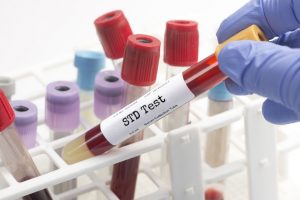9 Telltale Signs You Have A Gluten Intolerance
3.1 million Americans are currently following a gluten-free diet. But many people may be gluten intolerant and not even realize it. If you've been wondering if gluten has a negative…
3.1 million Americans are currently following a gluten-free diet. But many people may be gluten intolerant and not even realize it. If you've been wondering if gluten has a negative…
Fatigue is defined as extreme tiredness, and it can be caused by any number of mental health or medical conditions. Some of the most common causes for fatigue are easily diagnosed through simple lab tests. If you are experiencing frequent fatigue, you should consider other symptoms to try to narrow down the cause.
There are several different forms of anemia, but the most common is low iron levels in the blood. If you are anemic, you may also experience dizziness, weakness, and a pale complexion in addition to fatigue. This can be determined by a simple blood test. If confirmed, it can usually be treated with iron supplements.
Having high blood sugar can often make you feel fatigued. Shakiness when you do not eat, feeling extremely tired just after eating, or sweet-smelling urine are some additional symptoms of type two diabetes. This can also be determined through a simple panel of blood tests that will determine your blood sugar levels at time of test and for the previous three months. If confirmed, you will need to see a doctor for treatment. (more…)
As soon as you become pregnant, your health becomes even more important than it was before. In order to help your baby grow and develop without any complications, it’s essential that you monitor your health.
You can expect many doctor’s visits, tests, and examinations as your doctors work to evaluate your wellness and identify any potential complications. The following lab tests are standard for all pregnant women throughout the first, second, and third trimesters. Here’s what you can expect.
Anemia Testing
Anemia is a common blood disorder that occurs frequently during pregnancy. Without enough iron in the body, hemoglobin levels in red blood cells decrease, and oxygen cannot be efficiently transported through the body. Pregnancy increases the risk of becoming anemic, so this prenatal test is a quick and important to identify whether you need to take a daily iron supplement. You will need more iron than usual to support red blood cells as your baby and the placenta grow! (more…)
 Nobody welcomes cockroaches into their home, but sometimes they sneak in anyway. These pests aren’t just unappealing; they pose major allergy and asthma risks due to their saliva, droppings, and skin shedding.
Nobody welcomes cockroaches into their home, but sometimes they sneak in anyway. These pests aren’t just unappealing; they pose major allergy and asthma risks due to their saliva, droppings, and skin shedding.
If you have allergy symptoms but can’t find the source, it’s possible that your home is one of the 63% of U.S. residences that contain cockroach allergens. Make sure you understand how to identify and diagnose your cockroach allergy so you can efficiently eliminate the source of your symptoms.
Why Do Allergies Develop?
There are certain substances in the environment, like ragweed in the fall and pollen in the spring, that can trigger the immune system to act as if it is fighting off a foreign invader. When the immune system jumps to action like that, it creates histamines in the bloodstream that create unpleasant reactions like coughing, nasal congestion, skin rash, wheezing, and ear and sinus infections.
Your Cockroach Allergy
The German cockroach is the most troublesome in homes and is directly associated with causing asthma and allergy symptoms, The American Cockroach, also known as the Palmetto Bug in the south, is just as common and problematic. Since roaches adapt easily to most environments and are attracted to the warmth of buildings and homes at night, it’s possible to suffer from roach allergies all year long.
The following symptoms indicate that you could have a roach infestation causing allergies to roach saliva, waste, and body parts:
 Testosterone is widely known for its role as the male sex hormone. It plays many essential roles in the male body, especially sexual health and reproductive development. Testosterone is actually such a crucial hormone that the National Institutes of Health considers it the most necessary hormone in the male body.
Testosterone is widely known for its role as the male sex hormone. It plays many essential roles in the male body, especially sexual health and reproductive development. Testosterone is actually such a crucial hormone that the National Institutes of Health considers it the most necessary hormone in the male body.
Though a man’s testosterone levels peak during puberty and early adulthood, levels fall again with age. When testosterone levels fall too low, important body functions become less efficient, including the functions that control libido, bone mass, muscle mass, red blood cell production, fat distribution, and sperm production.
If you are experiencing symptoms that make you question your vitality and wellness, low testosterone could be to blame. Fortunately, a simple test can help you evaluate your testosterone levels and identify the best ways to boost your testosterone production. Before you undergo your testosterone testing, it’s important to understand the differences between free testosterone and total testosterone in the body.
What Is the Difference Between Free and Total Testosterone?
Not all testosterone functions the same within the body. Free testosterone travels through the blood unattached to any proteins. Only 2% of all testosterone is considered free testosterone. This small portion can move immediately into cells that need more testosterone to maintain proper body functions.
Total testosterone is the sum of the body’s free, bioavailable, and unavailable testosterone. Bioavailable testosterone includes all testosterone loosely bound to albumin and the carrier protein known as sex hormone binding globulin (SHBG). About 54% of all testosterone in the body binds to these proteins. (more…)
 Hepatitis is a serious health condition that affects the liver. This STD occurs in three different forms, which can make it confusing to understand. Here’s what you should know about Hepatitis A, B, and C to protect your health and get the treatment you need.
Hepatitis is a serious health condition that affects the liver. This STD occurs in three different forms, which can make it confusing to understand. Here’s what you should know about Hepatitis A, B, and C to protect your health and get the treatment you need.
What Is Hepatitis?
In general, hepatitis is defined as inflammation of the liver. Some cases of hepatitis are short lived, but others develop chronically over months or years. Viruses, alcoholism, and certain medications are all linked to the development of hepatitis.
Symptoms and Treatment for Hepatitis A
Hepatitis A is caused by a virus that spreads through the fecal-oral route. Infected people shed a large quantity of the virus in their stool, which makes it all too easy to spread to others through shaking hands, turning door knobs, answering the phone, and touching other common surfaces.
The most common symptoms of Hepatitis A include nausea, poor appetite, abdominal pain, fatigue, and dark urine. A blood test is needed to identify hepatitis A, but no specific treatment exists. Instead, the body needs time to recover from the virus on its own. In most cases, the liver can recover in six months with no lasting damage. (more…)
 If you’ve suffered through a urinary tract infection in the past, you know exactly how painful and uncomfortable the condition can become. Women are far more prone to UTIs than men, and some women even more than others. If you count yourself among the millions of women who are plagued by UTIs, the following information will help you seek a solution.
If you’ve suffered through a urinary tract infection in the past, you know exactly how painful and uncomfortable the condition can become. Women are far more prone to UTIs than men, and some women even more than others. If you count yourself among the millions of women who are plagued by UTIs, the following information will help you seek a solution.
What Are UTIs?
Urinary tract infections occur when bacteria gets trapped in the urinary tract. Since the urinary tract comprises of the kidneys, bladder, ureters, and urethra, there is plenty of space for bacteria to hide. The bladder and the urethra are the most common places for bacteria to live, and this creates infection as the bacteria irritates the body. (more…)
Top Tips for Protecting Your Immune System This Winter Thanksgiving has passed and the holidays are just around the corner–what an exciting time of year! From the family, friends, and…
 You never hope to contract an STD, but if you are sexually active, STDs pose a real risk. According to the Centers for Disease Control and Prevention, more than 19 million men and women in the United States contract some kind of sexually transmitted disease each year!
You never hope to contract an STD, but if you are sexually active, STDs pose a real risk. According to the Centers for Disease Control and Prevention, more than 19 million men and women in the United States contract some kind of sexually transmitted disease each year!
STDs cause uncomfortable and dangerous symptoms, but the good news is that most STDs caused by bacteria and can be treated or even cured with antibiotics. Even if an STD is caused by a virus, it can still be controlled with proper medical attention.
Whether you have syphilis, chlamydia, or any STD in between, here’s what you should know about treating your STD. (more…)
 Symptoms are tricky to interpret. Does your headache mean you’re dehydrated, stressed, or dealing with poor vision? It’s tempting to ignore symptoms and just hope they disappear, but the following five symptoms definitely need your attention since they could signal an STD.
Symptoms are tricky to interpret. Does your headache mean you’re dehydrated, stressed, or dealing with poor vision? It’s tempting to ignore symptoms and just hope they disappear, but the following five symptoms definitely need your attention since they could signal an STD.
Continual Vaginal Itching
Itches happen from time to time, but it isn’t normal to feel ongoing itching inside your vagina. If your itching becomes incessant and overwhelming, it could indicate a yeast infection… or it could indicate an STD like chlamydia, gonorrhea, herpes, or trichomoniasis. It is even more likely to be an STD if the itching is paired with any of the symptoms below. (more…)
Sign Up To Get Exclusive Health Updates, & Discounts from 24-7Labs.